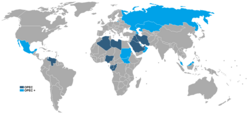
OPEC
Intergovernmental oil organization / From Wikipedia, the free encyclopedia
Dear Wikiwand AI, let's keep it short by simply answering these key questions:
Can you list the top facts and stats about OPEC?
Summarize this article for a 10 years old
The Organization of the Petroleum Exporting Countries (OPEC, /ˈoʊpɛk/ OH-pek) is an organization enabling the co-operation of leading oil-producing countries in order to collectively influence the global oil market and maximize profit. It was founded on 14 September 1960 in Baghdad by the first five members (Iran, Iraq, Kuwait, Saudi Arabia, and Venezuela). The 13 member countries account for an estimated 30 percent of global oil production.[2]
Organization of the Petroleum Exporting Countries (OPEC) | |
|---|---|
|
Flag | |
 OPEC and OPEC+ members | |
| Headquarters | Vienna, Austria |
| Official language | English |
| Type | Cartel[1] |
| Membership |
|
| Leaders | |
| Haitham al-Ghais | |
| Establishment | Baghdad, Iraq |
• Statute | September 1960 (63 years ago) (September 1960) |
• In effect | January 1961 (62 years ago) (January 1961) |
Website opec.org | |
In a series of steps in the 1960s and 1970s, OPEC restructured the global system of oil production in favor of oil-producing states and away from an oligopoly of dominant Anglo-American oil firms (the "Seven Sisters").[3] In the 1970s, restrictions in oil production led to a dramatic rise in oil prices with long-lasting and far-reaching consequences for the global economy. Since the 1980s, OPEC has had a limited impact on world oil-supply and oil-price stability, as there is frequent cheating by members on their commitments to one another, and as member commitments reflect what they would do even in the absence of OPEC.[4]
The formation of OPEC marked a turning point toward national sovereignty over natural resources. OPEC decisions have come to play a prominent role in the global oil-market and in international relations. Economists have characterized OPEC as a textbook example of a cartel[5] (a group whose members cooperate to reduce market competition) but one whose consultations may be protected by the doctrine of state immunity under international law.[6]
Current OPEC members are[ref] Algeria, Angola, Equatorial Guinea, Gabon, Iran, Iraq, Kuwait, Libya, Nigeria, the Republic of the Congo, Saudi Arabia, the United Arab Emirates and Venezuela. Meanwhile, Ecuador, Indonesia and Qatar are former OPEC members.[7] A larger group called OPEC+, consisting of OPEC members plus other oil-producing countries, formed in late 2016 to exert more control on the global crude-oil market.[8] Canada, Egypt, Norway and Oman are observer states.
